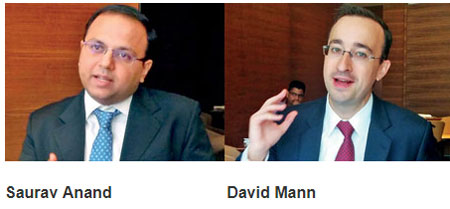Reply To:
Name - Reply Comment
Standard Chartered yesterday gave thumbs up for Sri Lanka’s economic outlook as the global investor interest in the country is “going through the roof” due to a combination of push and pull factors stemming from the island nation’s reform-oriented government to more adventurous investors, who seek higher yields.
According to Standard Chartered Chief Economist for Asia David Mann, a lot of cash is waiting in the sidelines to get into the emerging markets for either better value or for some major event-driven sell off to trigger a panic that would then offer the opportunities investors are looking for.
“In this backdrop, we are seeing a surge of interest in Sri Lanka from all our investor clients all around the world; whether they be based out of the US, Europe or the other parts of Asia,” Mann told a selected group of reporters in Colombo.

“I’m sure part of it is because of the successful outcomes from the IMF programme; but it is also because people have been looking for where else they can find yields even close to what they have seen here. Investors are running out of their usual suspects.” “I’ve noted that quite a lot of our peers, who used to never even look at Sri Lanka, have started to look at the country,” he added.
Standard Chartered South Asia Economist Saurav Anand, who was also present at the briefing, revealed that the feedback from a group of investors the bank organised to visit Sri Lanka recently was extremely positive.
“They met everyone: the government, the central bank, the IMF. They were very positive. They saw the fundamental changes in the government, the push for positive reforms; some of the reforms in the pipeline such as the new Inland Revenue Bill are also very positive,” Anand said.
He noted that the country has managed its currency well and the quality of the foreign exchange reserves is improving. Standard Chartered believes that the upcoming local government elections are unlikely to push the government to move away from its fiscal consolidation programme. Sri Lanka aims to reduce the fiscal deficit to 3.5 percent of gross domestic product (GDP) by 2020 from 7.4 percent in 2015.
Analysts opine that the current three-year extended programme Sri Lanka has with the International Monetary Fund (IMF) probably is the best the country so far has had with the multilateral lender, as it has taken certain ground realities into consideration when forming the conditions attached to the US $ 2.6 billion loan facility.
For example, unlike in the earlier programmes, the current one does not press on the government to drastically cut public expenditure but instead pushes to increase revenue, thus buying some much-needed political breathing space for the government.
In fact, the fiscal side improvements the country’s economy has seen so far could largely be credited to the IMF’s persistence towards the structural reforms Sri Lanka has been putting off for so many years. The fund even delayed two tranches at two occasions until the implementation of higher value-added tax and tabling of new Inland Revenue Bill in order to get the country’s fiscal front onto the right track.
Meanwhile, Standard Charted economists are of the view that the Trump administration or the US Federal Reserve would not opt for any move that would disrupt the markets.
“The present Fed policy can be termed as ‘dovish tightening’ as they want to have as little market impact as possible. They are absolutely adamant that they are not going to trigger some sort of market panic as a result of trying to exit from the quantitative easing programme,” said Mann.
He also pointed out that the US policy under the Trump presidency so far has been more words than action.
“So we are seeing a benign global economic growth situation. The European economy is growing; the US is in a better position than where they were in 1Q; Asia has been steady-sailing for quite some time and China hasn’t fallen off a cliff.”
As a result, he noted that the global economy is seeing an environment where people go around looking for better yields for their money and the countries like Sri Lanka tend to benefit from it.
“We believe that this adventurous environment is probably here to stay,” Mann said.
This stance of the Standard Chartered economists could be seen as a departure from their earlier ‘Welcome to the Jungle’ research brief this January, in which they forecasted 2017 to be an “exciting year with risks and possibilities lurking like the scene in a tropical jungle.”
Their latest research brief entitled ‘Swans, bulls and bears’ gives a more optimistic view of the global economy, but does not rule out any ‘black swan’ situations, such as possible escalation of tensions in the Korean Peninsula.
However, the global oil prices are not one of them as the Standard Chartered economists said that the crude oil barrel would remain around US $ 50-US $ 55 by the end of this year as they believe the era of extreme volatility in oil prices is probably over.